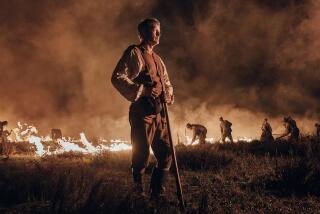Book review: ‘Daniel’ by Henning Mankell
- Share via
Most readers know the Swedish author Henning Mankell either for his political views — he is a strident critic of Israel and participated in the protest flotilla attempting to run its Gaza blockade earlier this year — or for his mysteries featuring Inspector Kurt Wallander. But there is a lot more to Mankell both as a writer and as an activist. The author of more than a dozen novels and many plays and television films (including his current project, a program about his father-in-law Ingmar Bergman) in addition to his detective fiction, he has been a lifelong opponent of colonialism and other forms of social and political oppression in Africa and elsewhere around the world.
The twin poles of his native Sweden and his adopted region of southern Africa come together in his new novel “Daniel,” which is light years away from his Inspector Wallander works. Originally published in Swedish in 2000 but only now translated into English, it is set a century and a quarter earlier (except for a moving epilogue set in 1995, which makes explicit Mankell’s own connection with his historical tale). This novel tells the story of Hans Bengler, an extremely odd Swedish naturalist engaged in an entomological quest that sends him to the Kalahari Desert in search of a newfound beetle he will be able to name and thus achieve some kind of immortality.
Bengler is not only a lost soul in every sense of the term — he will also end up literally lost partway through the novel — but a creature of impulse. This is what has led him on his far-flung quest and he now makes the extraordinary decision to rescue an orphaned boy of the San tribe (once known as Bushmen) from an abusive master and take him back to Sweden. Most of the novel concerns the difficulties of this lad — whom Bengler names Daniel but whom we discover is still “Molo” to himself — in an environment which is in almost every respect the polar opposite of what he has previously known.
Mankell is effective in showing us the child’s bewilderment at everything around him, from snow on the ground to carpets on the floor, and also the terrible memories that haunt him, including one of his beloved parents being brutally murdered in front of him by marauding German soldiers. Historical touches mingle with elements of magic realism to convey themes dear to the author’s heart. Mankell clearly wants to show that despite the obvious differences between an African desert and the forested Scandinavian landscape, there are similarities too. Cruelty and danger abound — there are poisonous serpents and cruel people in both places — and each has its share of social and political oppressiveness.
Unfortunately, Bengler is such a weird man acting almost entirely on whim that his lack of rational or even real emotional motivation makes him an unsatisfactory protagonist. Mankell suggests at one point that Bengler’s reason for carrying off and adopting the child involves lust, but since nothing more is done with this and the man seems resolutely heterosexual in what we do see, it seems to be a blind alley. Molo/Daniel is a more successful creation, but since his take on things is necessarily also decidedly partial and odd, the two lenses through which the reader perceives the story provide a pretty murky view.
But the real trouble with “Daniel” as a novel is that once Mankell has set up the dialectic between the twin desolations of the Kalahari Desert and Sweden and made his points about what happens when these twain meet, the book doesn’t have much more to say. As it winds its way toward the inevitable denouement that must happen to a fish out of water, which here does admittedly involve a nicely complex symbolic set of ironies, it simply spins around like a child’s top, winding down ever more slowly. And so the centrifugal force which at first so holds the reader’s attention eventually weakens to the point where he is no longer absorbed by a tale which has become simply repetitive instead of developing.
Rubin is the author of “Sarah Gertrude Millin: A South African Life.”


